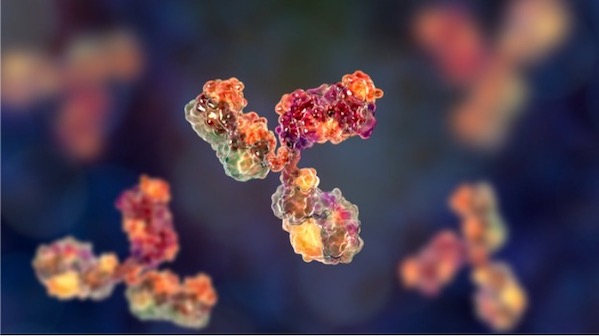Seagen, Nurix Team to Create New Class of Antibody Conjugates for Cancer
September 12, 2023
Source: drugdu
 460
460
By Tristan Manalac
 Pictured: Illustration of an antibody molecule/iStock, Dr_Microbe
Pictured: Illustration of an antibody molecule/iStock, Dr_Microbe
Seagen on Thursday inked a strategic collaboration agreement with San Francisco-based Nurix Therapeutics to develop a potentially new class of therapies—called degrader-antibody conjugates—that selectively kill cancer cells.
Under the terms of the agreement, Seagen will make an upfront payment of $60 million and pledge up to $3.4 billion in research, development, regulatory and commercial milestone payments. Nurix will also be entitled to receive mid-single to low-double digit tiered royalties on future sales.
The California biotech will also have the option for profit-sharing and co-promotion in the U.S., applicable to two products that emerge from the partnership.
Seagen and Nurix will combine their respective expertise and produce degrader-antibody conjugates (DACs), which combine the “tissue and tumor specificity of antibodies with highly potent and catalytic targeted degradation of cancer driver proteins,” Nurix CEO Arthur Sands said in a statement.
To achieve this, the partners will leverage Nurix’s proprietary DELigase platform, which makes use of the company’s deep array of E3 ligases and DNA-encoded libraries of small molecules to identify candidates that can either boost or reduce the levels of certain target proteins.
Seagen will nominate multiple targets for this approach and will be responsible for conjugating Nurix’s degraders to antibodies. Seagen will also take charge of advancing these DAC candidates through preclinical and clinical development, as well as be responsible for commercialization.
Because multiple antibodies can be conjugated to unique protein degraders, this collaboration has room for the possibility of developing and marketing several DAC drug products, according to Thursday’s announcement.
Antibody-drug conjugates (ADC) are biologic therapies that combine a monoclonal antibody with a chemotherapeutic drug. In theory, an ADC will seek out a protein on a cancer cell, thereby delivering its toxic payload specifically to its intended target.
This mechanism combines “the benefits of targeted therapy with the cytotoxicity of chemotherapy,” William Figg, oncologist at the National Institutes of Health, told BioSpace in a May 2023 interview.
DACs build on the fundamental science of ADCs, integrating the target specificity of antibodies with the functionality of an attached payload molecule. However, instead of carrying cytotoxic, anti-tumor drugs, DACs bear protein degraders, which use E3 ligase enzymes to destroy specific problematic proteins.
“DACs may represent a next generation of cancer medicine for a wide range of solid tumors and hematologic malignancies,” Sands said in a statemen
Read more on
- The first subject has been dosed in the Phase I clinical trial of Yuandong Bio’s EP-0210 monoclonal antibody injection. February 10, 2026
- Clinical trial of recombinant herpes zoster ZFA01 adjuvant vaccine (CHO cells) approved February 10, 2026
- Heyu Pharmaceuticals’ FGFR4 inhibitor ipagoglottinib has received Fast Track designation from the FDA for the treatment of advanced HCC patients with FGF19 overexpression who have been treated with ICIs and mTKIs. February 10, 2026
- Sanofi’s “Rilzabrutinib” has been recognized as a Breakthrough Therapy in the United States and an Orphan Drug in Japan, and has applied for marketing approval in China. February 10, 2026
- Domestically developed blockbuster ADC approved for new indication February 10, 2026
your submission has already been received.
OK
Subscribe
Please enter a valid Email address!
Submit
The most relevant industry news & insight will be sent to you every two weeks.



